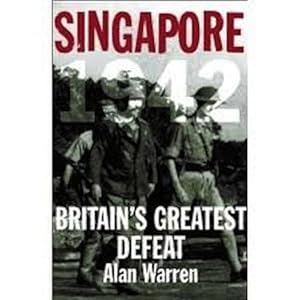One of my projects for this year is the Far East in WW2, probably starting with the Malayan campaign that culminated in the fall of the Singapore 'fortress'. As always a new project starts with some background reading and so I dusted down Alan Warren's 'Singapore: Britain's Greatest Defeat' that has been in my reading pile for some time.
This is a very good narrative of the campaign starting with preparations for war and then every stage of the allied retreat down the Malayan peninsula to the last stand on Singapore Island. Very readable with reasonable maps and a good selection of photographs.
 I suppose what shocked me the most was the absence of good military intelligence on the Japanese army. After all they had recently fought the Russians and the Chinese. In lectures troops were told that the Japanese were small, myopic and technically backward. An Australian battalion commander opined that his men deserved a better enemy and the British military attache in Tokyo complained that "our chaps place the Japs somewhere between the Italians and the Afghans".
I suppose what shocked me the most was the absence of good military intelligence on the Japanese army. After all they had recently fought the Russians and the Chinese. In lectures troops were told that the Japanese were small, myopic and technically backward. An Australian battalion commander opined that his men deserved a better enemy and the British military attache in Tokyo complained that "our chaps place the Japs somewhere between the Italians and the Afghans".At a strategic level, successive British governments failed to adequately prepare for a conflict in the Far East and there was little chance of rectifying the position after war broke out in Europe. There was no real fleet and air cover was minimal. There were arguably sufficient land forces, indeed the Japanese were outnumbered for most of the campaign. Rearguard operations were poorly handled with heavy losses in manpower and equipment caused by disorderly withdrawals.
General Percival gets much of the blame and he undoubtedly made many mistakes. He clearly should have replaced units in Malaya rather than letting them be degraded in continuous operations. British, Indian and Australian troops were in the main better equipped than the Japanese, particularly in terms of artillery and vehicles. They were also regulars, volunteers or reservists - not conscripts. They may not have had tanks, but they had enough anti-guns guns had they been used better. The speed of operations in Malaya was an obvious problem for senior commanders operating in a WW1 manner.
I haven't finally decided if I am going to do this campaign in 15mm for FoW or 28mm Bolt Action, or both. I am also attracted to the pre-war actions in China and against the Russians. More reading to follow.
No comments:
Post a Comment